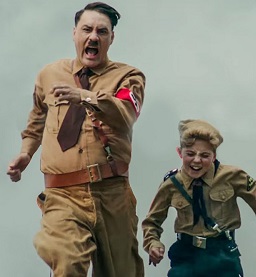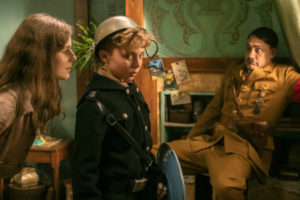Jojo Rabbit
 Try this story line on for size: It’s 1944. A ten-year-old German boy is infatuated with Adolf Hitler and the Nazi movement. Sure, nationalism runs high – particularly during times of war – but this kid is incessant. So much so that he and his friends make wild claims about Jews, Poles, and others on the Nazi “hate list.”
Try this story line on for size: It’s 1944. A ten-year-old German boy is infatuated with Adolf Hitler and the Nazi movement. Sure, nationalism runs high – particularly during times of war – but this kid is incessant. So much so that he and his friends make wild claims about Jews, Poles, and others on the Nazi “hate list.”
But not is all as it seems for young Johannes. You see, his mother Rosie secretly operates within the Nazi resistance, and is harboring an orphaned teenage Jewish girl in the Betzler family’s attic. But Rosie doesn’t divulge her allegiance to Johannes (nicknamed Jojo), lest he turn her in to the authorities. Would he do that to his own mother? Probably not, but 10-year-old boys are not known for tight lips.
Year’s most unique film
Such is the set-up for one of the most unique films of 2019, and one of this year’s Best Picture Oscar nominees – Taika Waititi’s “Jojo Rabbit,” based on Christine Leunens’ novel “Caging Skies.” It’s hard to classify “Jojo Rabbit” as a straight drama, given that much of Waititi’s adapted screenplay is very funny, and that Jojo regularly converses in his imagination with Hitler – played as a blustery buffoon by Waititi himself. Yet it can’t very well be pigeonholed as a comedy either, given the gravity of World War II, and the fleeting lives of some of the primary characters, particularly when the Soviets and British commence their invasion of Berlin. “Jojo Rabbit” is one of those unique films that simply can’t be described, other than to say it needs to be seen to be believed.
Story and cast
Newcomer Roman Griffin Davis carries the entire picture as the title character. His superb acting borders on caricature in the opening sequences, in which Jojo and his best friend Yorki (Archie Yates) attend a spirited Hitler youth training camp. The young boys are taught (to humorous effect) the ins and outs of handling weapons and attacking the enemy, while the young girls are trained as student nurses. It’s all played for comic effect, particularly given Jojo’s frequent downloads to his abstract Hitler.
 Jojo lives with his mother (played by Oscar nominee Scarlett Johansson), while his father is in Italy fighting with the Nazi army. Jojo’s older sister has recently died of influenza. Into Jojo’s rigid, nationalistic life comes a horror for which he is decidedly unprepared – the Jewish girl, Elsa, played by Thomasin McKenzie as somewhat of an older sister figure to Jojo. At first, Jojo treats Elsa like dirt – espousing Nazi propaganda ad nauseum and proffering some of the wildest disinformation about Jewish people ever heard. It’s at once hilarious and chilling, given the fact that many Nazis believed (or forced themselves to believe) such untruths.
Jojo lives with his mother (played by Oscar nominee Scarlett Johansson), while his father is in Italy fighting with the Nazi army. Jojo’s older sister has recently died of influenza. Into Jojo’s rigid, nationalistic life comes a horror for which he is decidedly unprepared – the Jewish girl, Elsa, played by Thomasin McKenzie as somewhat of an older sister figure to Jojo. At first, Jojo treats Elsa like dirt – espousing Nazi propaganda ad nauseum and proffering some of the wildest disinformation about Jewish people ever heard. It’s at once hilarious and chilling, given the fact that many Nazis believed (or forced themselves to believe) such untruths.
Unlikeliest of allies
But Jojo’s mother has apparently warned Elsa, and she gently absorbs his rhetoric, eventually assuming the role of a friend. As their affection and respect for one another deepens, Jojo and Elsa become the unlikeliest of allies, particularly when the war strikes just outside their home.
Weightier than expected
Again, for a film that begins as a comedic satire (a la, the 2017 farce “The Death of Stalin”), “Jojo Rabbit” turns out to garner more weight, or heft, than originally suspected. We are drawn to these characters, particularly Jojo. Seen at first as a comedically misguided youth, we grow with him in his understanding of cultures different from his own. The underlying theme of youthful comradery is reminiscent of a Stephen King novel, and the evolution of the title character is downright absorbing.
Best Picture nominee
“Jojo Rabbit” is a very good film, and certainly deserving of its Best Picture nod. Will it win? Likely not, as much of its competition is weightier – including favorite “Marriage Story,” another picture starring Scarlett Johansson. She has deservedly been nominated for her performances in both films. But “Jojo Rabbit” certainly puts writer-director Waititi on the map, it furthers the career of Thomasin McKenzie (who was so great in last year’s “Leave No Trace“), and I sincerely hope it marks the beginning of the career of Roman Griffin Davis. Again, he carries this film from start to finish, and his performance cultivates from parody to consequential as “Jojo Rabbit” proceeds.
I hope years from now, “Jojo Rabbit” will be seen as more than a mere curiosity. This is truly one of the most unique pictures I’ve ever seen.
Andy Ray‘s reviews also appear on http://youarecurrent.com/category/nightandday/film-reviews/
and he serves as the radio film critic for https://lifestyleindy.com/radio/